My husband has been nagging me to buy a new stove. He can’t
stand “Mr. Click Click” -- the burner that won’t ignite without help. Every
time he reaches for the lighter stashed in the nearby drawer, he says, “You
deserve a better stove. When will you buy a new one?” When it breaks down.
Last week, I went back on my word. I wanted a
better stove. My 4-year old, $650 Kenmore (on the left) still worked but was looking scruffy
from my scrubbing off various kitchen disasters, including soy milk boil-overs.
(Mind that pot and no emailing or texting!) The stove endured Asian Dumplings and Asian Tofu, and began showing its battle wounds. I spent
several days shopping for a higher-end replacement. Yes, my husband was right: I deserved to step up!
I researched online, queried friends and chatted with salespeople – who were
well poised to share their knowledge and move merchandise, given the Black
Friday sales that are already underway; it’s no longer a post-Thanksgiving
shopping frenzy.
Each time I buy a new stove, I have to get up to speed on the latest models and trends. My 2012 adventure in stove shopping included these basic reminders and revelations:
Buy for Needs, Not
for Looks
I approach appliance salespeople by telling them what I do
for living and what I need. My hope is that they’ll be frank. This time around,
I told them I could go as high as $2000 (yowza!). One salesman said that at that price
point, many people buy for status, not for actual cooking. As a result, they
have high-performance, showroom quality kitchens that are rarely used. Occasionally,
customers don’t take the appliance labels off after installation! Seriously?
Because I do most of my cooking stovetop, my top priorities
are burner output and grates. For recipe
developing, I need at least 1 regular (9,100 BTU) burner to approximate what
the average cook may experience in their kitchen. Wok cooking, a stockpot of pho,
and volume cooking are easier with extra heat from a booster burner (15,000+
BTU). I’d visited the test kitchens at Saveur, Gourmet, Bon Appetit and Cooking Light magazines where relatively common stoves are the
workhorses. There was no point in getting too fancy.
It didn’t seem outlandish to get at least one booster burner,
if not two, in addition to a regular burner. Turns out that mid-range home
stoves these days often come with simmer burners (5,000 BTU), which I have
little use for. (Shouldn’t all good burners be able to simmer?) Additionally, there
is usually an oval shaped griddle burner for pancakes, etc, which I rarely make;
my comal for tortillas works fine on two regular round burners. I was stuck
with the simmer and griddle burners in the LG stove that I eventually bought. Aside from heating griddles, what can the
oval burner do?
BTU output aside, the grates are key to efficiently heating pots
and pans. I like relatively hefty ones that’ll conduct heat well, but that can
also be scrubbed with relative ease. I slide pots and pans around the stove and continuous grates help. At the store, I often pick up the grates
to imagine dealing with them on a regular basis. You can deal with them better
in the sink if they’re in 3 sections. I think about clean-up when shopping for
kitchen appliances and tools.
Convection vs. Conventional
vs. Double Ovens
At the mid-range price levels, many stoves come with
convection ovens. I wasn’t interested in convection ovens but fellow authors and test
kitchen pros Amanda Hass (Williams Sonoma, OneFamilyOneMeal.com) and Kate Leahy (A16, Preservation Kitchen, SPQR, ModernMealMaker.com) said that
they loved convection ovens. However, for recipe testing and development, their
default was the conventional oven.
Andrew Janjigian (Cook’s Illustrated, WorldLoaf.org) pointed out that you don’t know
what kind of convection oven cooks have (there are variations in the technology) so it’s better to stick with a regular
oven for recipe development.
Gawd, I was worried that I’d be stuck with a convection oven
once I stepped up from my beat up Kenmore. Alas, you can switch between the
two, I was told. Fabulous.
Stoves with double ovens are pricier than single oven
stoves. What gives? If you have kids and have to cook different things for
them, double ovens are useful, I was told. Functionally, the broiler in a
double oven tends to be weak, a salesman told me. “Don’t get it for what you do,”
he added. Love salesman straight talk.
Stainless Steel Ups
and Downs
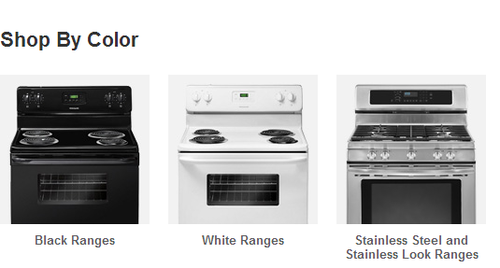
Kitchen appliances finished in stainless steel look fabulous
but they can be hard to keep clean, I’ve been warned for years. I didn’t care
because I could never afford them. This time shopping for kitchen appliances,
the price for stainless steel didn’t seem as scary. I may have adjusted my
brain to be willing to spend more but some stoves on the market are combining
stainless with black. The hybrid approach brings the price down. Nice surprise.
Nevertheless, appliance salespeople advised against a stainless cook top like the one above because
every scratch becomes noticeable. I don’t really buy that because every mark on
my black ceramic coated stove is visible. They’re culinary battle wounds that
my stove wears with pride. But will I notice the stainless steel
mars faster? The first dent or scratch
is always the most painful.
On the other hand, if you go the Full Monty and get a stainless
steel cook top, you’re bound to pay more but not get better performance. The
lack of bang for my buck made going full stainless steel a moot point. "Stainless steel look" was more my speed.
The stove is my best friend in the kitchen. After I got the
skinny on the functional basics and appearances, I dug a little deeper. I realized
that I didn’t need to spend $2000 on a stove. The next post delves into stove
add-ons and tips for finding a good deal. Stay tuned.
Have savvy stove shopping experiences or tips to share?
Related post: Stove Buying Tips: Weeding through Add-ons, Reviews and Deals













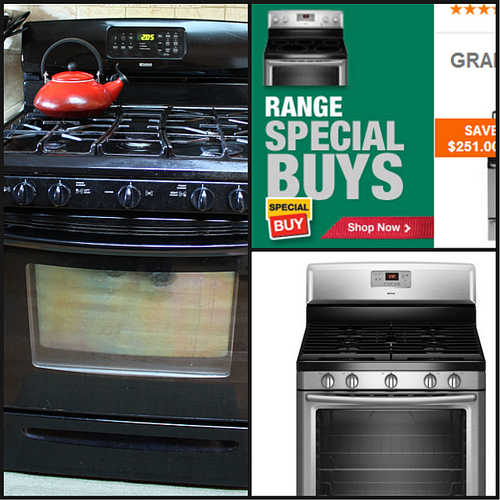
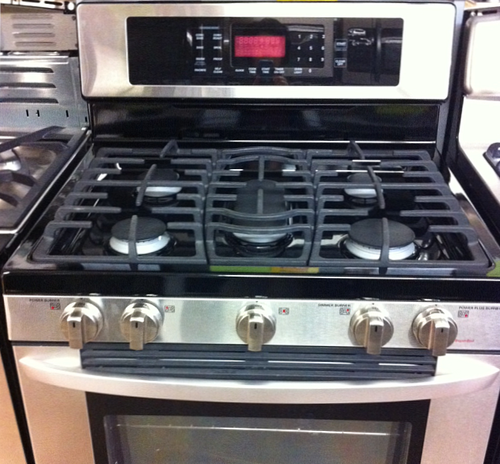
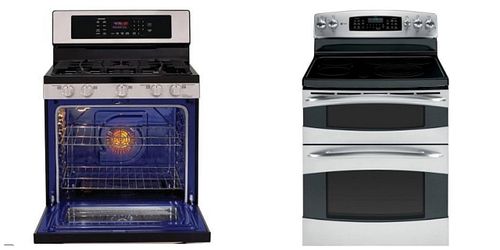
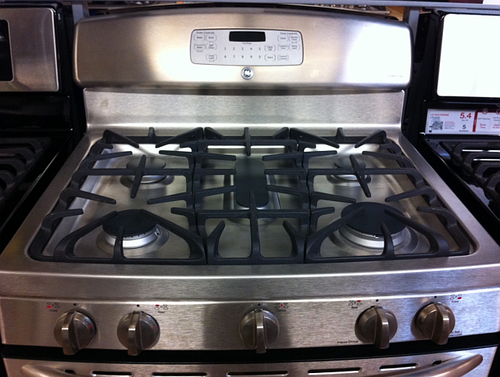




Thanh says
If you bake alot, the electronic display goes bad relatively quickly and it's a very expensive repair. I ended up getting a new stove and now I'm just waiting for the display to go bad...it has been 2 years to-date. Let me know what you find out. If it goes bad again I'm tempted to buy an old Merritt O'Keefe.
Diane says
I agree on the simmer burner.
I cooked on a really crappy 24" studio kitchen stove for 14 years, and an underpowered 30" builders model stove ($300 tops I am sure) for another 6 until I broke down and bought a good stove. GE profile, and I don't think I've ever used its griddle. Basically you can cook on anything, but I find the continual grates and my one high power burner nice to have. I do wish I'd bought a stove hot enough to wok on, but I'm too cheap to get the really pricy ones (DCS would be nice).
Meg says
I finally got a gas line hooked up so as to get a gas cooktop (ended up with an all-in-one) after dealing with electric for many years...$6000 all in (stove/cooktop included). While I love the gas - thank you, consistent heat and never a boil-over - pretty much from the get-go we had a "clicker" and the only way to getting to stop is by turning on another specific burner. Unfortunately the clicker was the most useful burner of the lot. I think there is no win, ever.
David says
I have 2 ovens, one is digital (combination oven-microwave) and the other is a regular electric oven. I had the repair guy here to callibrate them recently and he told me that digital ovens are much more accurate. Also a smaller oven preheats a lot faster than big ones (folks considering large restaurant-style ovens who bake a lot might want to consider that.)
The one drawback to digital ovens are all the beepers and timers, which frankly, drive me nuts. When my digital oven is preheated, it's starts beeping incessantly until I put something in it. (Heck, most of the time, it's not ready!) So those kinds of "features" are the drawback to digital. My ovens have convections features, but as you mentioned, if you're testing recipes for home cooks, the results will be different so I test only at the regular setting. Although I use that feature for everyday cooking, when I'm not timing things for testing.
If I was doing it again, I would not get a digital oven because of the learning curve. I want on and off, and a temperature dial.
Suzette says
I only have a stovetop with a separate oven, which limits my selection. Our house was recently converted to gas (I *hate* the electric), and I think this is my next stove: http://www.dcsappliances.com/product/indoor/cooktops/index.cfm?productuid=0C2BA106-EB9E-8441-B109C449EF739237
The rings have dual output (two rings of fire!) for better precision, especially for simmering. The salesman also said that it has bronze rings, which is much more durable for the abuse that I'll be putting it through! I too was ready to plonk down $2000 on a stove that I'll love, but the one I'm eyeing is only about $1300. This is a timely discussion, and I'm looking forward to your subsequent posts!
Andrea Nguyen says
Oh yeah, I had the electronic control panel die out on the first Kenmore I bought for about $550. The repair guys said it would cost $350 to replace. My response was buying a new stove for $649.
I push the "add a minute" button a lot when recipe testing, and was expecting the control panel to poop out but it hasn't after 4 years. I'll cross my fingers for yours to not go out too. The modern stoves are just not as solid as the old ones.
Andrea Nguyen says
If you can cook on a crappy 24" studio stove, you can cook on practically anything. That's the type of stove my husband (then boyfriend) had when we first met. It was flimsy but did the job just fine.
Why won't manufacturers get rid of the simmer and griddle burners? They should let you choose the burners. I'd pay a little more for that custom option.
Andrea Nguyen says
Wow, what a drag, Meg. Mr. Click Click has gotten worse over time. You're right, you just can't win but that's a lot of money to spend. Why can't manufacturers or installers get it right?! Oye.
Maggie says
Agree about the oval burner and easy-to-clean grates. I would recommend lightweight, slimmer ones that fit in the dishwasher, especially if you do a lot of wok cooking. Additional size and weight do not make grates any more hardwearing, and cleaning unwieldy, cast iron ones in the sink is no fun! Personally, I would splurge on the oven over the stove, but then I do a lot of roasting and less stove-top cooking. A steam oven is great for cooking large fish, Chinese style.
Andrea Nguyen says
Thanks for your insights, David. You're absolutely right about restaurant-style stoves taking an extra long time to preheat; a friend with a Wolf range says he plans 40 minutes to preheat his oven.
Cookbook authors like us have to live with timers beeping -- like I sometimes hear it though it's not really happening. The LG stove I ordered apparently chimes instead of beeps. I have no idea what the chime sounds like but it's better than "Gangnam Style" eh?
Andrea Nguyen says
That is a very handsome stove! Looks simple and sturdy. Great find!
Andrea Nguyen says
You put your grates in the dishwasher? Wow. I've never done that before. Gutsy.
Wmkwhite says
I finally went Italian for a cooktop and I'm glad I did. Bertazonni makes great range tops and stoves and I think they would bracket into your cost range. Best thing... they usually come with a central double ringed burner that is perfect for a wok (they even throw in a wok support ring), but alas they also usually come with a simmer burner. Good for a double boiler though. Good luck in finding the perfect stove... it's work!
Andrea Nguyen says
I was wondering about the Bertazoni ranges. Thank you for validating their quality! Maybe if enough of us voice disgruntlement about simmer burners they'll go away.
I girl can only hope...
zsuzsi says
I'm not a cookbook writer but I do host a lot of dinner parties. The problem I run into is not having enough space on top of the stove. If I have 2 large pots they bang into each other. And then I can barely fit 2 more small pots. My next stove has to have at least 5 burners so that more than one large pot can be accommodated.
Thanks for sharing your insights!
Maggie says
I've never seen a stove with a simmer burner option, but surely it would be very useful for braising/slow cooking, even for gentle steaming, or making rice on the stovetop without having to remember to use a diffuser? I often find it hard to to adjust the gas for a slow, even steam. Just wondering.
Quyen says
I second the central double ringed burner. We had to get a new cooktop and we went with this one...http://www.kitchenaid.com/product/KFGS306VSS.uts?noFlash=true&PIPELINE_SESSION_ID=229104a4c0a85d65329b5c95bb89ff1f
That central fifth burner can boil water for my ramen in seconds! LOL. I love it.
Suzette says
Uh-oh, I was afraid of this...That one is really nice too and now I'm doubting my pick!
If you put a big pot in the middle, do you still have room for medium-or-bigger-size pots on the other burners?
Andrea Nguyen says
Maggie, it's just a wimpy 5,000 BTU burner. I make rice on a 9,100 BTU burners and turn it down to low. Works great. What kind of stove do you have?
Maggie says
I've had my Smeg 90cm range for about 12 years. It has six burners, one with a double ring in the corner, which is more practical than having it in the middle, encroaching on all surrounding burners. I have had to replace parts over the years, mostly from my clumsiness, such as smashing the glass on the oven door, and normal wear and tear (I use the oven most days), and so the nice thing is the excellent customer service and ease of ordering new parts. Before you buy, do check the warranty, and the manufacturer's customer service reputation. I'm willing to splurge on appliances, but they must be repairable - I do a lot of cooking, often for large numbers, and I am not precious with kitchen equipment.
Maggie says
If it's a big stock pot, then, no, there will not be much space for another big pan. Better to have the powerful burner in the corner.
silvie says
I have the kenmore stove/oven that came with the house, a ceramic top with a digital panel. The panel fails when I bake french bread along with a pot of boiling water to crisp the crust. Moisture gets into the panel making all the buttons dysfunction. I have to wait (beep beep beep) or try to dry it out by pointing a hair dryer in the vents. I detest the ceramic top - inconsistent heat.
Quyen says
If the pot is around 12 inches or so, then there is room for other pots and pans around it. Even larger frying pans will still leave room for smaller 8 inch pots.I have never had trouble with it. I love how it's only a 30 in wide cooktop, yet has 5 burners. We use the central burner a lot!
Jess Toons says
Thanks for sharing this article, its just what I was looking for. I haven't had much experience with buyingstoves Olathe co. I have saved up the money for a good one and now I'm really nervous about making it work. I have heard great things and now I'm going to get one that will hopefully last more than a year this time. Thanks!
calily says
This is the stove we got when we moved into our new house a few years ago: http://www.fullhouseappliances.com/fpgs3085kf.html
I really like the panel in the front (since gas burners get soooo hot the back panels are no bueno).
One of the burners has 17,000 BTU's which is great for my wok and boiling water in a big pot.
I'm using the convection oven a lot -- such crispy chicken!
Overall, I'm completely satisfied with the oven!
Shaun William says
Thanks for sharing this article!! Cooking on a gas stove is quite different than cooking on an electric stove. Gas stoves heat up much more quickly than its electric stove.